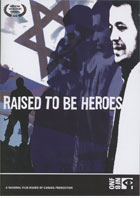
Raised to be Heroes 2006
Distributed by Bullfrog Films, PO Box 149, Oley, PA 19547; 800-543-FROG (3764)
Produced by The National Film Board of Canada
Directed by Jack Silberman
DVD, color, 54 min.
Sr. High - Adult
Jewish Studies, Military Studies, Middle Eastern Studies
Date Entered: 04/10/2008
Reviewed by Sharon Whitfield, Multimedia Librarian at Christopher Newport UniversityRaised to be Heroes, captures the rising movement of refuseniks who are Israeli Defense Forces (IDF) that refuse to serve based on their objections to the Israeli occupation of Palestinian settlements.
The program is a series of edited refusenik interviews, brief sidewalk comments and snapshots of the events that led to the Israeli occupation. To capture the rationale of the refusenik movement, the camera focuses on six refuseniks that currently serve in the IDF reservists and have chosen a brief prison sentence over their deployment to the Israeli occupied settlements. Each refusenik describes their long, difficult process, which finalized in their refusal to serve. While some refuseniks’ received family support, others faced confrontation with family members and Israeli society because their refusal contradicts the protection of the Israeli state.
Although the program spends 54 minutes attempting to evoke empathy and understanding for the refuseniks, the program fails to elicit the desired response from the audience. Instead, Raised to be Heroes seems adrift and monotonous focusing on the who and what rather than why the refusenik movement exists. The program moves from one edited interview to another without transition, leaving the audience confused and indifferent.
Writer and director, Jack Silberman, creates a biased pro-refusenik documentary. The DVD cover asks the question, “What happens when soldiers act out of conscience?” however Silberman fails to educate the viewer so that they may attempt to answer this question. The audience is kept ignorant of the liberalism in Israeli Defense Force policies because Israeli government officials were not interviewed for the Raised to be Heroes documentary. Also, Silberman never digresses from creating a positive image of the refusenik movement. The audience can not determine what effect refusing service has on the IDF, the Israeli state or the safety of the Israeli citizens. Lastly, it would have been beneficial for Silberman to discuss the previous refusenik movements, which date back to the 1970’s, how the current refusenik movement deviates from those of the past, and the different variations of refuseniks, which range from those who refuse to enter the IDF to those who only refuse to serve in the occupied territories.
Both past and current Israeli refusenik movements are noteworthy for Middle Eastern Studies; however, a collection would benefit more from an alternative title, Dear Father, Quiet We’re Shooting. While Dear Father, Quiet We’re Shooting also does not evoke empathy for the refuseniks, the subjects of the film are more compelling and two generations discuss their viewpoint on IDF service.